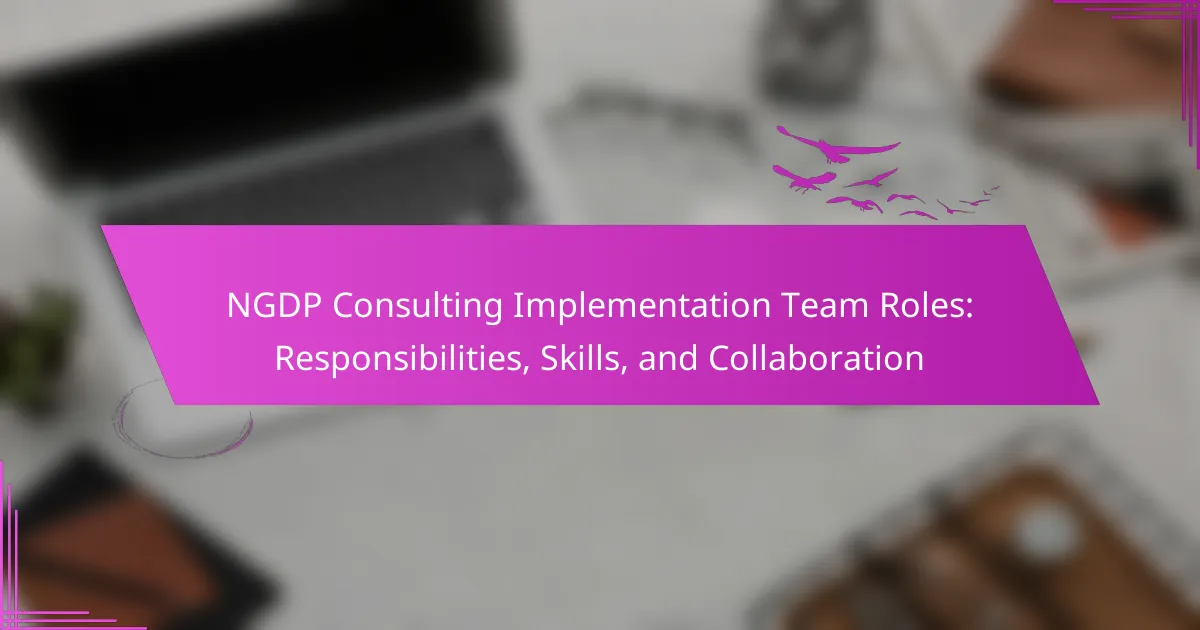
What are the roles within the NGDP Consulting Implementation Team?
The roles within the NGDP Consulting Implementation Team include project manager, consultant, analyst, and technical specialist. The project manager oversees the project’s progress and ensures alignment with client goals. Consultants provide expertise and strategic insights to guide implementation. Analysts gather and interpret data to inform decision-making. Technical specialists handle specific technical tasks and ensure system integration. Each role collaborates to deliver successful project outcomes. The defined roles enhance team efficiency and effectiveness in meeting client needs.
How do these roles contribute to successful project outcomes?
The roles within the NGDP Consulting Implementation Team contribute to successful project outcomes by ensuring clear responsibilities and effective collaboration. Each role is designed to leverage specific skills that address project needs. Project managers coordinate tasks and timelines, facilitating communication among team members. Subject matter experts provide specialized knowledge, enhancing the quality of solutions. Analysts gather and interpret data, informing decision-making processes. Effective collaboration among these roles fosters innovation and problem-solving. According to a study by the Project Management Institute, projects with clearly defined roles are 30% more likely to succeed. This structured approach minimizes misunderstandings and aligns team efforts towards common goals.
What specific responsibilities does each role hold?
The specific responsibilities of each role in the NGDP Consulting Implementation Team vary based on the position. The Project Manager oversees project timelines and resource allocation. They ensure that project goals align with client expectations. The Business Analyst gathers requirements and analyzes data to inform decisions. They bridge communication between stakeholders and technical teams. The Technical Lead manages the development team and ensures technical solutions meet project specifications. They also troubleshoot technical issues as they arise. The Quality Assurance Specialist conducts testing to ensure deliverables meet quality standards. They identify defects and work with the team to resolve them. Each role contributes uniquely to the project’s success through collaboration and expertise.
How do these responsibilities interconnect within the team?
Responsibilities within the NGDP Consulting Implementation Team interconnect through collaboration and shared objectives. Each team member’s role is designed to complement others, ensuring efficient project execution. For example, project managers coordinate timelines while analysts provide data insights. This synergy enhances problem-solving capabilities. Communication channels facilitate information flow, allowing team members to adapt to changes swiftly. Regular meetings reinforce alignment on goals and responsibilities. Ultimately, interconnected responsibilities lead to improved project outcomes and team cohesion.
What skills are essential for members of the NGDP Consulting Implementation Team?
Essential skills for members of the NGDP Consulting Implementation Team include project management, communication, and analytical skills. Project management skills enable team members to oversee tasks effectively and meet deadlines. Strong communication skills facilitate collaboration among team members and with clients. Analytical skills allow team members to assess data and make informed decisions. Additionally, problem-solving skills are crucial for addressing challenges that arise during implementation. Technical proficiency in relevant tools enhances efficiency and effectiveness in project execution. Finally, adaptability is essential for navigating changing project requirements and client needs.
Which technical skills are required for effective implementation?
Technical skills required for effective implementation include project management, data analysis, and software proficiency. Project management skills help in planning, executing, and monitoring projects efficiently. Data analysis skills enable team members to interpret data and make informed decisions. Software proficiency is essential for using various tools that facilitate implementation processes. Familiarity with programming languages can also enhance automation and integration tasks. Understanding system architecture aids in aligning technical solutions with business needs. These skills collectively ensure that implementation is carried out smoothly and meets organizational goals.
What soft skills enhance collaboration among team members?
Soft skills that enhance collaboration among team members include effective communication, active listening, empathy, and adaptability. Effective communication fosters clear exchanges of ideas and information. Active listening ensures team members feel heard and valued, enhancing trust. Empathy allows individuals to understand and relate to each other’s perspectives. Adaptability helps teams navigate changes and challenges smoothly. Research by the World Economic Forum identifies these skills as essential for teamwork and collaboration in the modern workplace.
How does collaboration function within the NGDP Consulting Implementation Team?
Collaboration within the NGDP Consulting Implementation Team operates through structured communication and defined roles. Team members engage in regular meetings to share updates and discuss project progress. Each member has specific responsibilities that align with their expertise. This clarity fosters accountability and enhances teamwork. The team utilizes collaborative tools for document sharing and task management. These tools facilitate real-time communication and streamline workflows. Feedback loops are established to ensure continuous improvement. This collaborative approach leads to effective problem-solving and project success.
What tools and practices facilitate teamwork in this context?
Effective communication tools and collaborative practices facilitate teamwork in the context of NGDP Consulting implementation teams. Tools such as project management software streamline task assignments and track progress. Communication platforms enable real-time discussions and feedback among team members. Regular check-ins and status updates foster accountability and transparency. Collaborative document editing allows simultaneous contributions, enhancing efficiency. Team-building activities strengthen interpersonal relationships and trust. Utilizing these tools and practices leads to improved project outcomes and team cohesion.
How does effective communication impact project success?
Effective communication significantly enhances project success. It ensures that all team members understand their roles and responsibilities. Clear communication reduces misunderstandings and errors. It fosters collaboration among team members. According to a study by the Project Management Institute, projects with effective communication are 20% more likely to succeed. Regular updates and feedback loops keep everyone informed. This transparency builds trust within the team. Ultimately, effective communication leads to better decision-making and timely project delivery.
What are the challenges faced by the NGDP Consulting Implementation Team?
The NGDP Consulting Implementation Team faces several challenges. One significant challenge is managing stakeholder expectations. Misalignment can lead to project delays. Another challenge is adapting to changing client needs. This requires flexibility and quick decision-making. Resource allocation is also a critical issue. Limited resources can hinder project progress. Additionally, communication barriers can arise within the team. Effective collaboration is essential for success. Lastly, navigating complex project requirements poses difficulties. These challenges require strategic planning and problem-solving skills.
How can these challenges be mitigated through better role definition?
Better role definition can mitigate challenges within the NGDP Consulting Implementation Team. Clearly defined roles enhance accountability among team members. This reduces overlap in responsibilities, which can lead to confusion. When each member understands their specific duties, communication improves. Improved communication fosters collaboration and reduces misunderstandings. Specific role definitions also facilitate better resource allocation. This ensures that the right skills are applied to the right tasks. Ultimately, this structured approach leads to increased efficiency and project success.
What strategies can improve collaboration despite these challenges?
Effective strategies to improve collaboration include establishing clear communication channels. Regular check-ins enhance team cohesion. Utilizing collaboration tools streamlines project management. Setting defined roles and responsibilities minimizes confusion. Encouraging open feedback fosters a culture of trust. Providing team-building activities strengthens interpersonal relationships. Training in conflict resolution equips teams to handle disputes. Research indicates that teams with defined structures are 25% more effective in achieving goals.
What best practices can enhance the effectiveness of the NGDP Consulting Implementation Team?
Establishing clear communication channels enhances the effectiveness of the NGDP Consulting Implementation Team. Regular updates and feedback loops foster transparency and accountability. Utilizing project management tools streamlines task assignments and progress tracking. Setting measurable goals ensures alignment with project objectives. Encouraging team collaboration promotes diverse perspectives and innovative solutions. Providing ongoing training improves team skills and adaptability. Conducting regular performance reviews identifies areas for improvement and recognizes achievements. These practices lead to higher efficiency and successful project outcomes.
How can ongoing training and development benefit team members?
Ongoing training and development can significantly enhance team members’ skills and knowledge. This leads to improved job performance and productivity. Regular training keeps employees updated with industry trends and best practices. It also fosters a culture of continuous learning within the organization. Enhanced skills can lead to job satisfaction and employee retention. According to a report by the Association for Talent Development, companies that invest in training enjoy 24% higher profit margins. Additionally, ongoing development encourages team collaboration and innovation. Team members become more adaptable to change, which is crucial in dynamic work environments.
What role does feedback play in team performance improvement?
Feedback is crucial for team performance improvement. It provides insights into individual and collective strengths and weaknesses. Regular feedback fosters open communication among team members. This communication leads to enhanced collaboration and trust. Constructive feedback helps identify areas for skill development. According to a study by the Harvard Business Review, teams that engage in frequent feedback show a 20% increase in performance. Feedback also aligns team goals and expectations, ensuring everyone is working towards the same objectives. Overall, effective feedback mechanisms are essential for continuous improvement in team dynamics and output.
The main entity of the article is the NGDP Consulting Implementation Team, which comprises distinct roles including project manager, consultant, analyst, and technical specialist. Each role is defined by specific responsibilities that contribute to successful project outcomes through collaboration and effective communication. Essential skills for team members encompass project management, analytical abilities, and interpersonal skills, while various tools and practices facilitate teamwork. The article also addresses challenges faced by the team and outlines strategies and best practices to enhance effectiveness and improve performance through ongoing training and feedback mechanisms.
